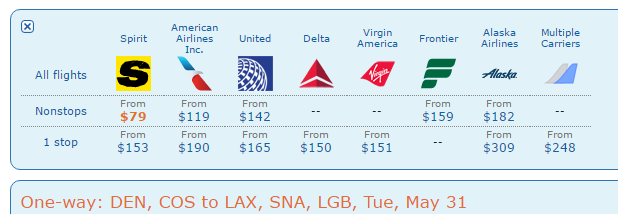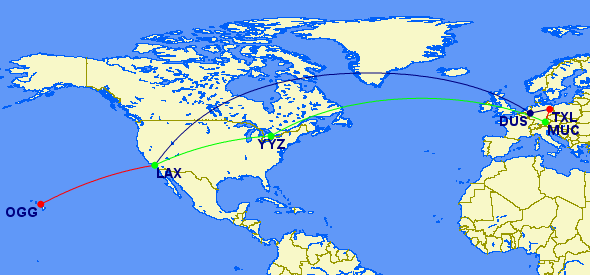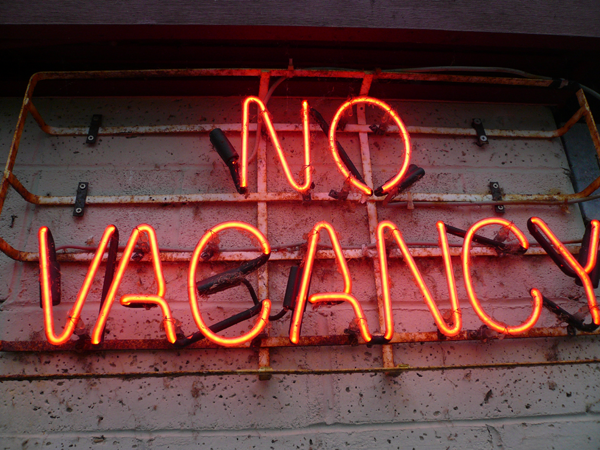Quick recap: Miles are dead, yadda, yadda, yadda…
—
What’s the value you earned from using your miles instead of buying a ticket in cash? This is an important metric to use; it helps us to decide when to use our miles, it also lets us put a value on the miles we earn. Yesterday we discussed the importance of this, along with our T-Rate for calculating when to Make or Buy our travel. The standard rule of thumb for calculating the value of a mile is:
(Paid ticket cost – any booking fees & taxes)/ number of miles.
So a $300 ticket that you booked with 25,000 miles and $11.20 would mean your miles were worth $.011552 each. Today we’ll discuss some of the benefits of using miles that can increase their value.
Airlines are Flexibility Pusher Sellers
Yesterday I discussed a booking for my family to go to Denver for a wedding. Ideally I’d really like us to be able to spend an extra day or two enjoying ourselves. I want some flexibility in this upcoming trip, and like a good Milenomic, I don’t really want to pay anything for it. 😉
I used the following ITA Matrix search:

To illustrate options for the Denver trip. I talked about how airlines sell time; discounting 1 stop flights over nonstop options, charging you to waste your time. Not shown here is the cost of flexible tickets. A quick search of fares on carrier websites will also show you the cost of flexibility. Most carriers now bundle cancellation, checked bags, and other “perks.” An example from AA.com:

For each direction that I need that flexibility AA is willing to sell it to me. For just a little more I can have the ability to cancel the fare should something arise. I don’t really spend much time learning about these cash grabs because my elite status (Titanium) allows me to skip theaw fees anyway.
Backup Booking: DEN-LAX
To build in flexibility in this trip, I’m going to make a backup booking. I want to book us home a day later, Tuesday. Sure, I can always change our Southwest tickets, but due to WN’s dynamic pricing there are no guarantees that this will work out to our advantage. The price of the DEN-LAX nonstop the next day I want could go up, or down by the time I decide if we can get the days off of work. If It goes down I would certainly re-book with Southwest, but if it doesn’t I need a hedge.
Enter: Avios.
 a DEN-LAX booking would cost me 7,500 Avios per person, plus $5.60. I’m only going to lose the $5.60 per person if I need to cancel. So I’ll book it, and sort it out later. I can take the AA flight Tuesday, the WN Flight Monday, or re-book my Southwest flight and fly home Tuesday with them.
a DEN-LAX booking would cost me 7,500 Avios per person, plus $5.60. I’m only going to lose the $5.60 per person if I need to cancel. So I’ll book it, and sort it out later. I can take the AA flight Tuesday, the WN Flight Monday, or re-book my Southwest flight and fly home Tuesday with them.
Calculating Value in the Above Example:
A quick search of return flights on Tuesday shows me that my 7,500 Avios are a poor value:

I could fly home for $79, close to just 1Cent per Avios. The floor for my Avios is 1.25 Cents because that’s where I can sell them. At 1 Cent per Avios I’d be better off to sell the Avios and buy the ticket with cash (Buy Vs. Make). Except I can’t book this ticket right now. In fact I can’t book any of the above fares; because they’re non-refundable. In order to calculate the value of this Avios booking I need to consider the flight I *might* have had to book with cash should I have wanted the same flexibility in schedule.

$179 is more what it would take to book this flight back. In that situation my Avios could represent as high as a 2.3 Cent per mile value ($179-$5.60)/7500. Of course there are some caveats: If I don’t take this flight and end up rebooking with Southwest there’s no value at all, and just a $5.60 “Flex” charge. In addition you probably have firmer plans than I do, and no need for this much trickery. That’s all well and good; but consider the cost of flexibility, and possible think to include it in your future plans.
You could even use this as a low level hedge; Book a flight home the next day, and hope for the best on your ideal day. If/When that ideal flight hits, cancel and lose the $5.60, rebooking onto your ideal day. My Flexibility Matrix for this trip looks like this:

So, How DO You Calculate the Value of a Mile?
Some miles are very flexible; ANA miles, when used for an award, have low cancellation fees. The above mentioned BA Avios of course also have a low cost to cancel. Southwest points don’t inherently have any additional value since their worth is pegged to the price of a paid ticket, and those are also allowed to be refunded. (Edit:See Shonuffharlem’s excellent comment below, outlining the extra value WN points do have over paid WN bookings). They are immensely helpful however in filling in schedules that need a second option.
There are quite a few different ways to value your miles; but the one that I advocate the most here at Milenomics is to compare the ticket you would have flown to the number of miles you used. It doesn’t help to pick the value of a fare that can be cancelled if your travel plans fixed. It also doesn’t help to pick the cost of a flexible ticket simply because your award can be cancelled. If you know your plans are set in stone then the flexibility isn’t something you will need, and shouldn’t be included in your value calculations.





Your missing one thing on SW – miles are fully refundable, cash is not (usable up to 1 year from purchase date). No big deal if you fly SW a lot, but for someone who may only do 1-2 SW trips a year points thus have more value.
It also makes ANY SW ticket more valuable in total cost (if you factor in trips you don’t end up actually doing after purchase). A $225 SW flight vs. a $200 AA flight, I would argue the SW flight is cheaper (since if I can’t go for some reason I can take the $225 with me as a credit, the $200 AA flight I lose $200 entirely).
And you forget also the value in fighting with someone because they paid for only 1 priority boarding and are holding the whole row for their entire family in SW’s chaos boarding scheme. Getting the blood boiling and feeling alive is worth something isn’t it? 🙂
Great point Sho’Nuff, there’s value there for sure having cash in your bank account instead of a travel bank. I’ve updated the post to include your comment. There are also baggage fees to consider for some, and as you said the value (or lack of) of the “southwest experience.”
I use a tweaked formula for redemption valuations:
(Paid ticket cost – any booking fees/taxes)/(number of miles redeemed + number of miles not earned)
Thanks for sharing your method. Sad to see how far the programs have cut the miles earned on paid flights, isn’t it?
Insightful! In your formula, what is the rationale for dividing fees by taxes?
Good catch Andrew. I was using the / not as a divisor but as a true slash, Fees or taxes. I’ve cleared it up.
Where can you sell Avios for 1.25 cents?
I sell them to friends and family. The best sales I do are to a cop I know; He pays me for tickets to Hawaii. $400 for each r/t ticket from LAX. I book them with Avios. Win win. I also charge him a $20 change fee for any changes or cancellations he needs to make. One time he kept being unable to get time off, pushed the ticket back 6 times. I made $96 just in change fees for him and his companion. I’m debating a checked baggage fee next 😉
Extend out your net; see who you know who travels and try brokering them tickets.
the amoun tof money made needs to greatly outweight the shut down that will probably come when you book too many ppl tickets. something to consider
One other advantage of paid WN flights that is rarely mentioned is that their gift cards can be purchased at office supply and grocery stores, which provide a secondary rebate at the least.